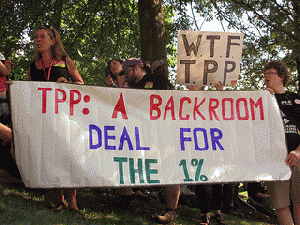The agriculture section of the Ecology Branch of the Green Shadow Cabinet opposes the Trans-Pacific Partnership (TPP) as the latest Free Trade Agreement (FTA) assault against food sovereignty, where the profits of multinational companies are placed ahead of the food security needs of individual nations. The TPP seeks to revive the stalled expansion of the World Trade Organization.
by GlobalTradeWatch
The TPP is a trade agreement under secret negotiation by by Australia, Brunei, Chile, Canada, Malaysia, Mexico, New Zealand, Peru, Singapore, the United States, and Vietnam. Japan will join at the next meeting).
Access to food is a basic human right. Instead, TPP expands the notion that food is just another commodity subject to economic speculation and exploitation solely to increase the profits of multinational corporations. TPP promotes export-oriented food production, its passage will increase global hunger and malnutrition, alienate millions from their productive assets and resources; land, water, fish, seeds, technology and generations of cultural knowledge.
In order to guarantee the independence and food sovereignty of all of the world's peoples, it is essential that food is produced though diversified, community based production systems. Food sovereignty is the right of peoples to control their own food and agriculture; to protect and regulate domestic agricultural production and trade in order to achieve sustainable development objectives; to determine the extent to which they want to be self reliant; to restrict the dumping of agricultural products in their markets, and; to guarantee local fisheries-based communities the right to manage their aquatic resources.
A TPP trade agreement will impact all levels of the food system, from the growers, to the markets distributing the food; from the quality of the food available to consumers, to the ability of governments to protect and be held accountable to their people. The TPP is designed to help agribusiness get bigger and more powerful in their drive to consolidate ownership of the food system -- from seed to shelf. The TPP will speed up the global race to the bottom in terms of farm prices, workers' wages, environmental standards and human rights.
Farmers have been excluded from the negotiations over TPP. Access to meetings and materials are limited to officials and corporate stakeholders. U.S agricultural representatives are predominantly Big-Ag supporters, including Monsanto, Dupont, Syngenta, and Walmart. Free Trade cannot be Fair trade when the people are excluded.
TPP will empower agribusiness to sue countries for trying to limit the kinds of food they import. Domestic food safety standards can also be challenged / weakened as barriers to trade. The TPP will increase risks to food safety in the U.S, as similar "equivalence rules" in prior agreements have forced the U.S. to, for example, permit the import of sub-standard meat product.
Public Citizen, a non-governmental organization, points out that there are over $13 billion in pending corporate "investor-state" trade pact attacks on domestic environmental, public health and transportation policy. Mere threats of such cases have repeatedly resulted in countries dropping important public interest protections, exposing their populations to harm that could have been avoided. The use of international tribunals to overturn regulations has increased dramatically in the past decade. Tobacco firms are using the regime to challenge tobacco control policies.
Yet while TPP countries have agreed to provide foreign investors an array of extraordinary new privileges, the TPP countries have not required investors to agreed to health, labor or environmental obligations.
Like the North American Free Trade Agreement (NAFTA), which displaced millions of Mexican corn farmers, the TPP is expected to flood markets with cheap products, increasing pressures on small farmers to grow cash crops, rather than traditional food crops. And, like NAFTA, TPP will force small farmers off the land forcing them to migrate to cities, and cross borders hoping to survive. FTAs have undercut the right of local producers to receive a fair, locally determined price for their products by forcing farmers to compete in the global food market.
As a result of FTAs, agricultural production has increased the use of fossil fuels for production and transportation, thereby increasing pollution; increased the use of chemical inputs; expanded the health and environmental risks associated with genetically modified material; and reduced biodiversity by favoring mono-cropping.
Many environmental, farm and fair trade groups are concerned about the negative impact the TPP could have on where and how dairy products are produced and processed. The U.S. dairy industry generates $140 billion in economic activity and employs an estimated 900,000 workers, while providing nourishment to millions more. The nation cannot afford to compete with dairy imports produced under unfair conditions.
Rather than adopt the TPP, governments must uphold the rights of all peoples to food sovereignty and security, and adopt and implement policies that promote sustainable, family-based production rather than industry- led, high- input export oriented production.
The Green Shadow Cabinet supports agroecological trade policies that:
(Note: You can view every article as one long page if you sign up as an Advocate Member, or higher).





